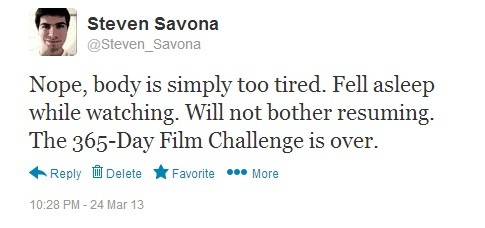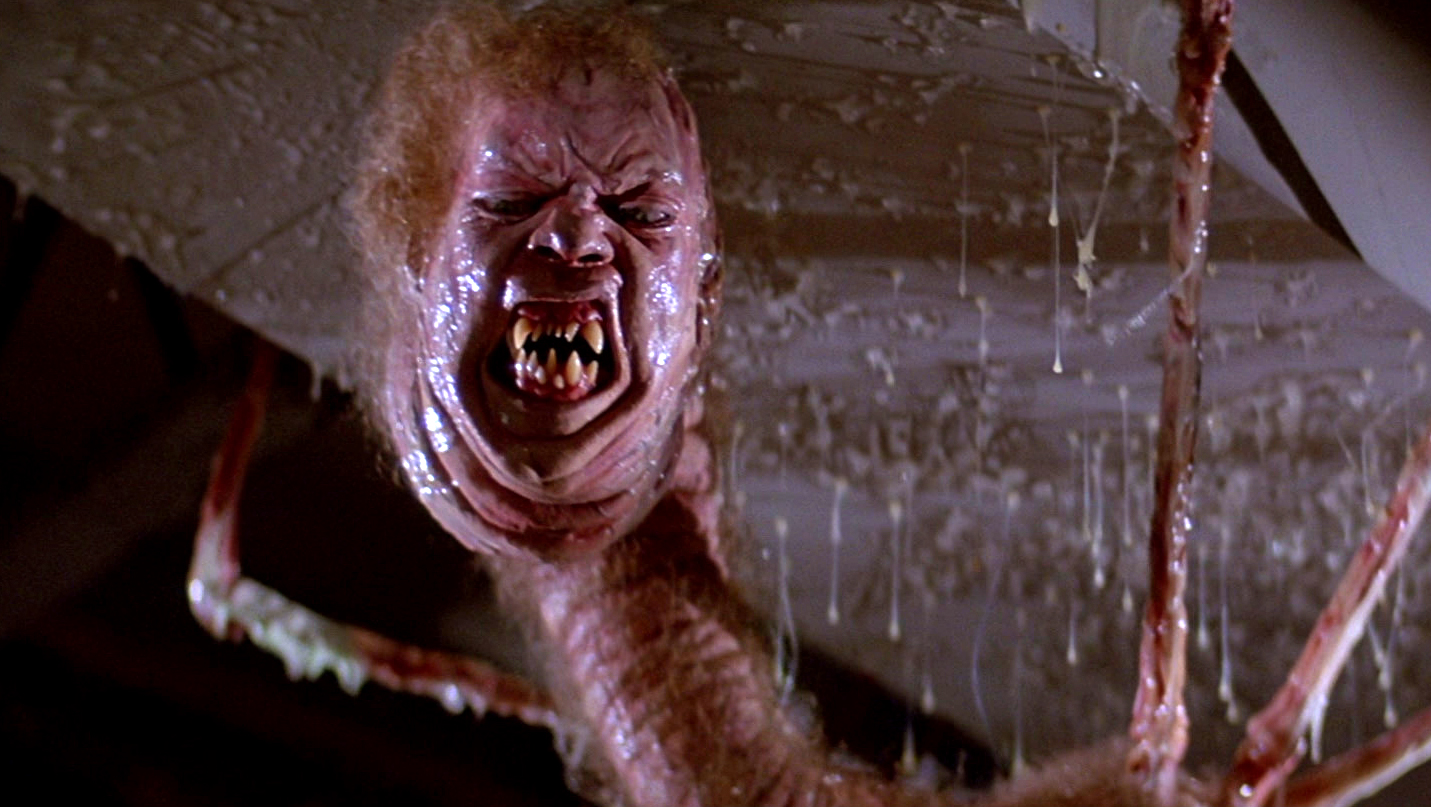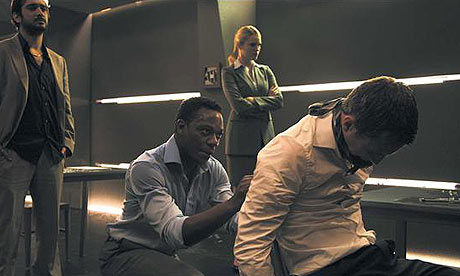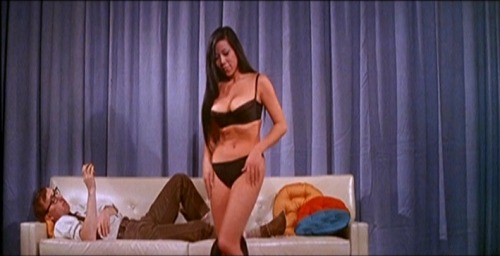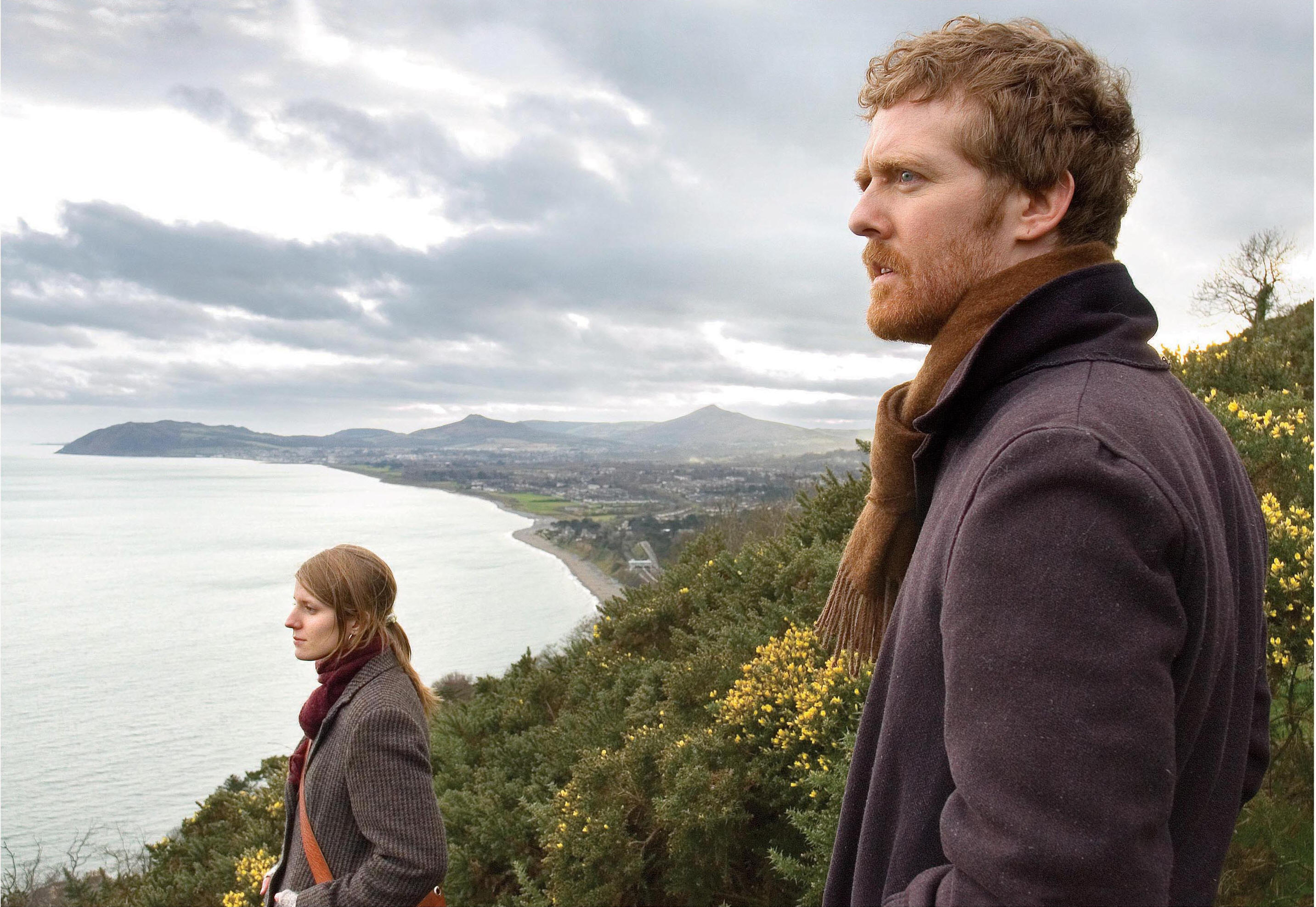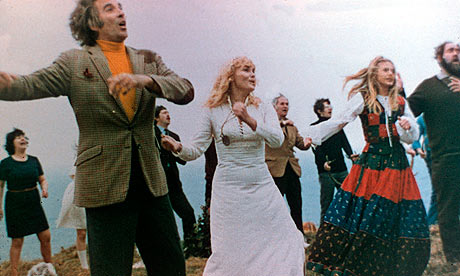My first Chaplin film was a very good one. Speaking of firsts, this was Chaplin's first proper 'talkie', having established himself in silent films such as
It was his most commercially successful film, but also the one that attracted the most controversy. Chaplin's likeness to Adolf Hitler (complete with toothbrush moustache) is no accident. He wanted to make a mockery of the man, even if it politicised the film too much. But it is Chaplin's six-minute monologue towards the end of the film that has inspired the most criticism. It is a humanistic speech that calls for a society governed by science and progress, where empathy eradicates selfishness. Some people have called it the greatest speech of all time, but plenty of people think it is awkward and uncalled for, as Chaplin breaks the fourth wall and espouses his personal politics. I am a fan of the speech, but I can certainly see why many object to it.
Despite being a little overlong, I was fairly impressed by this offbeat comedy. It was a lot more emotionally complex than I expected. The ambiguity of the characters is very refreshing. Every character has their flaws, and sometimes it's tough deciding who to root for. If the title doesn't make it evident, the film is about the challenge of getting over a past lover, and I was surprised at how strongly I empathised with this theme despite never having been in a relationship myself. I don't think this film would have worked in any setting but Hawaii.
Mark O'Brien was an American poet
who contracted polio in his childhood, rendering him paralysed from the neck down and dependent on an iron lung. The Sessions is about O'Brien's quest to lose his virginity with a sex surrogate at the age of 38. That sex surrogate, Cheryl, is played by Helen Hunt, in a role that earned an Oscar nomination. How John Hawkes wasn't nominated for Best Actor astounds me. This film could have fallen to pieces in other hands, but Lewin's treatment of the material is sensitive and mature. The sexual contact between Mark and Cheryl isn't erotic. It is gentle—just one woman doing her job and in the process making a man feel good about himself. I'm sure many people will watch this solely for Hunt's full-frontal nudity, but I hope they'll take something from it other than how supple her bosom is. Recommended reading: On Seeing a Sex Surrogate, Mark O'Brien's article that was used as the film's source material.
FEBRUARY 14
Less Than Zero (Marek Kanievska, 1987) = 1.5/5
This film is a reminder to not get too sentimental about the 80s. Yeah, John Hughes made some great movies for young adults, but every now and then, a film like Less Than Zero came along and it sucked. I think the title refers to the amount of effort devoted to making us care for the characters. Look, I haven't read Bret Easton Ellis' novel on which this is based, but I'm less inclined to after watching this. It is so damn dated, brimming with all the excesses that characterise bad 80s films. Oh, and have I mentioned how boring it is? Watching these rich kids prance around LA is just plain uninteresting.
FEBRUARY 15
Alice Doesn't Live Here Anymore (Martin Scorsese, 1974) = 4.5/5
This is Scorsese's forgotten gem. Ellen Burstyn is terrific, and so is Alfred Lutter as her precocious son. A young, androgynous Jodie Foster is also a pleasure to watch. The whole film is imbued with a cinéma vérité feel, which made me get so involved in it. The use of popular music is great here, and I knew I was in for a treat when I heard Mott the Hoople's All the Way from Memphis and Elton John's Daniel within the first 30 minutes of the film. It's one of the quintessential films of the 70s.
FEBRUARY 16
Ms. 45 (Abel Ferrara, 1981) = 2.5/5
A mute seamstress is raped twice in one day, goes insane, and begins killing men throughout New York City using a .45 caliber gun. That is the plot of Ms. 45, one of the most popular exploitation films of all time. As an exploitation film, it delivers quite well, but it never transcends its provocative sensibilities. It's always intent on shocking the audience, and I question whether Ferrara wanted to make a film with a message, or if he just wanted to give viewers something that packs a punch. I must give credit to the late Zoë Lund on her voiceless performance as the eponymous character.
FEBRUARY 17
Super Troopers (Jay Chandrasekhar, 2001) = 4/5
Don't let the generic title or poster fool you. Super Troopers is a very funny movie. I was pleasantly surprised by how often and how hard it made me laugh. The best thing about the movie is that it realises how silly it is and doesn't try to emit an intellectual vibe. The humour is clever, but the plot is fairly run-of-the-mill. I envy everyone who worked on this film. It must have been so much fun to make.
FEBRUARY 18
Amour (Michael Haneke, 2012) = 4.5/5
While it may not be the most entertaining film, it has a subtle emotional power that creeps up on you when you least expect it. Amour is a great film about the ravages of age and the things we do for love, which confirms Haneke's status as one of the most original and daring filmmakers working today. Trintignant and Riva are fantastic as husband and wife, and it often feels like you're watching a real-life couple go about their daily lives.
FEBRUARY 19
Opening Night (John Cassavetes, 1977) = 3.5/5
I had never seen a John Cassavetes film before this one. I'd heard a lot about his style and how it polarises audiences. Well, I neither loved or hated it. As for the movie itself, I liked it in parts, but it just went on for too long, and I didn't really care for the characters. The performances, however, are brilliant. Gena Rowlands is terrific as a stage actress who is mentally shaken by an incident whereby a young fan dies trying to see her, and descends into alcoholism as a result. Cassavetes regular Ben Gazzara is solid as usual. Cassavetes himself is wonderful as Rowlands' co-star in the play.
FEBRUARY 20
What's Up, Tiger Lily? (Woody Allen & Senkichi Taniguchi, 1966) = 2.5/5
In a way, this is Woody Allen's directorial debut. In another way, it isn't. You see, Allen obtained the rights to a cheesy Japanese spy film, International Secret Police: Key of Keys. He stripped the film of its entire vocal track, and re-dubbed it in English as a comedy about the search for the world's best egg salad recipe. Hilarious concept, right? Well, I really enjoyed the first 30 or so minutes, but the novelty soon began to wear thin. The movie reinforces the importance of character development and dialogue. The former is missing, which makes for a less engaging picture. The latter has been re-dubbed, illustrating how the screenplay is the crux of a film. Worth seeing for sheer originality alone.
FEBRUARY 21
Starter for 10 (Tom Vaughan, 2006) = 4/5
I'm calling it. This is one of the most intelligent and perceptive romantic comedies I've ever seen. It just radiates charm. This is essential viewing for any trivia nerds, and, if I may be shallow for a moment, it features one of the most physically attractive ensemble casts I've seen in a while. Benedict Cumberbatch is so funny here.
FEBRUARY 22
Once (John Carney, 2006) = 3/5
Can someone tell me why this film receives so much acclaim? It's a musical, and the music is lovely, but as an entire film, this is frustrating. The jumpy camera is so annoying and not much happens except for the making of music. I didn't buy the intimacy between the two leads. It almost felt as though I was watching the special features of a concert on DVD, and this was under "Behind the Scenes". It's such a strange film. In fact, I feel funny just calling it a "film". Once almost defies classification.
FEBRUARY 23
The Wicker Man (Robin Hardy, 1973) = 4.5/5
This film is deliciously weird and subtly horrifying. Just reading the IMDb plot summary gives me chills: "A police sergeant is sent to a Scottish island village in search of a missing girl whom the townsfolk claim never existed. Stranger still are the rites that take place there." It's one of the best British films I've ever seen, and maybe even one of the best horrors I've seen. The final scene will haunt you forever.
FEBRUARY 24
Dr. Strangelove or: How I Learned to Stop Worrying and Love the Bomb (Stanley Kubrick, 1964) = 3/5
I felt so shitty with myself after watching this film. Kubrick is one of my favourite directors of all time, and this is one of the most acclaimed films of all time, and yet I didn't like it that much. I felt like a simpleton, thinking I didn't "get it", or that the satire was above my level of comprehension. I thought the characters were interesting, but the plot completely lost me. I think it's because I approached this film expecting laugh-a-minute material, and underestimated its ability to have an actual plot. The film was very much ahead of its time, as was a lot of Kubrick's work. The best part of Dr. Strangelove was Peter Sellers. Comic genius.
FEBRUARY 25
Bicycle Thieves (Vittorio De Sica, 1948) = 5/5
The doggedness of the human spirit is a powerful thing. The setting is post-World War II Rome. A man's bicycle is stolen, and this really complicates matters as he needs the bicycle for his job, and he of course needs the job to support his family. So, along with his son, the man searches all over the city. Do they find the bike? That's something I'll leave you to find out. The film reminds us that life is often unfair, but there are silver linings to be found, however small. It is timeless and has universal appeal, but will especially resonate with those who know what it's like to go without.
FEBRUARY 26
The Departed (Martin Scorsese, 2006) = 4/5
I'm not a major crime enthusiast, but I've developed an admiration for the films of Scorsese, so felt compelled to check out this Best Picture Oscar winner. I thought it overstayed its welcome and was often confusing (especially towards the end), but that confusion may be due to the fact I don't watch many crime films. It's still a very good film with all the usual Scorsese touches, and it's quite accessible for those not too familiar with the veteran's work. Jack Nicholson's performance is outstanding. Oh, I've gotta ask: Did anyone else get confused between DiCaprio and Damon? It got to a point where I found it difficult to tell them apart. *Sigh* Silly me!
FEBRUARY 27
Take the Money and Run (Woody Allen, 1969) = 3.5/5
If we remove the experimental What's Up, Tiger Lily? from Woody Allen's filmography, this is the film that stands as his directorial debut. It is a whole lot of farcical fun. Allen's brand of comedy here is almost surreal, such as when he attempts to rob a bank by asking written permission. It is not Allen's greatest film, but it is undoubtedly one of his funniest.
FEBRUARY 28
Dawn of the Dead (Zack Snyder, 2004) = 0.5/5
I fucking despise this movie. I'm not calling it a film because that might trick some people into thinking it has an ounce of artistic merit. This was my second time watching it. I first saw it when I was 11 or 12, and don't remember liking it. However, I decided to give it one more go. Being older and more knowledgeable about movies, I thought I might be able to appreciate it this time. I was also curious to rewatch it because I had since learnt that this remake garnered critical acclaim and has a large cult following. I wanted to know what the hype is over. Well, I had already lost interest after 20 minutes, and began checking Twitter which was a lot more entertaining. I didn't completely zone out, though. The problem is that I TRIED to get into it, but just couldn't. Ask me to describe the plot and the best I can do is "Uhh, zombies?" The camera was moving so fast, it made Transformers 2 look like a Béla Tarr film. Seriously, how do people watch this and process a narrative in their mind? I think its main goal was to recreate frame 313 of the Zapruder film, over and over again. Oh, and one last thing. I'm sick of this notion that zombie horror is a sacred niche, as though all zombie films are "cool" or "fucking awesome" merely because, well, they contain zombies. What's so great about a zombie? I would guess than 90% of the fans of Dawn of the Dead are teenage males who fantasise about zombie apocalypses and wish the Saw franchise was still kicking because "ZOMG gore!". I don't know what I'm saying anymore, and I'm probably being too snarky here. The last thing I'll say about this movie is that it's one of the worst movies I've ever seen, and you can quote me on that.
Final thought: My February was bookended by two awful films. I hope this never happens again.
